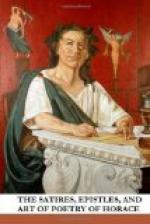To place their ban on middling poetry.
At a great feast an ill-toned instrument,
A sour conserve, or an unfragrant scent
Offends the taste: ’tis reason that it should;
We do without such things, or have them good:
Just so with verse; you seek but to delight;
If by an inch you fail, you fail outright.
He who knows nought of games abstains from all,
Nor tries his hand at quoit, or hoop, or ball,
Lest the thronged circle, witnessing the play,
Should laugh outright, with none to say them nay:
He who knows nought of verses needs must try
To write them ne’ertheless. “Why
not?” men cry:
“Free, gently born, unblemished and correct,
His means a knight’s, what more can folks expect?”
But you, my friend, at least have sense and grace;
You will not fly in queen Minerva’s face
In action or in word. Suppose some day
You should take courage and compose a lay,
Entrust it first to Maecius’ critic ears,
Your sire’s and mine, and keep it back nine
years.
What’s kept at home you cancel by a stroke:
What’s sent abroad you never can revoke.
Orpheus, the priest and harper, pure and good,
Weaned savage tribes from deeds and feasts of blood,
Whence he was said to tame the monsters of the wood.
Amphion too, men said, at his desire
Moved massy stones, obedient to the lyre,
And Thebes arose. ’Twas wisdom’s
province then
To judge ’twixt states and subjects, gods and
men,
Check vagrant lust, give rules to wedded folk,
Build cities up, and grave a code in oak.
So came great honour and abundant praise,
As to the gods, to poets and their lays.
Then Homer and Tyrtaeus, armed with song,
Made manly spirits for the combat strong:
Verse taught life’s duties, showed the future
clear,
And won a monarch’s favour through his ear:
Verse gave relief from labour, and supplied
Light mirth for holiday and festal tide.
Then blush not for the lyre: Apollo sings
In unison with her who sweeps its strings.
But here occurs a question some men start,
If good verse comes from nature or from art.
For me, I cannot see how native wit
Can e’er dispense with art, or art with it.
Set them to pull together, they’re agreed,
And each supplies what each is found to need.
The youth who suns for prizes wisely trains,
Bears cold and heat, is patient and abstains:
The flute-player at a festival, before
He plays in public, has to learn his lore.
Not so our bardlings: they come bouncing in—
“I’m your true poet: let them laugh
that win:
Plague take the last! although I ne’er was taught,
Is that a cause for owning I know nought?”




